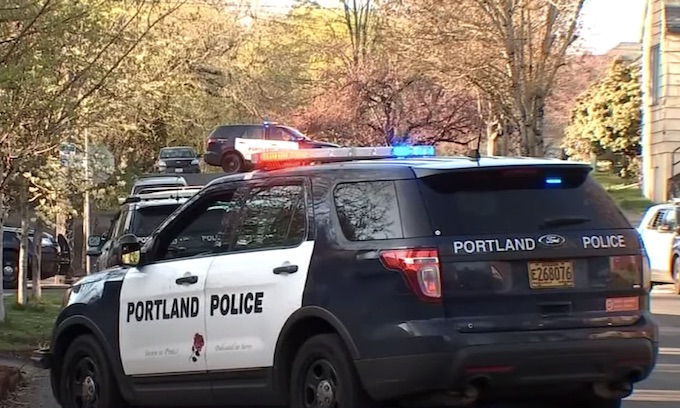Portland’s police chief and mayor are set to announce Tuesday that city police will no longer stop motorists for low-level infractions, such as equipment failures or expired plates, to reduce disproportionate stops of people of color.
And if police do stop drivers, officers must explain that the motorist can deny a request to search their cars.
The changes also are aimed at curtailing the potential for deadly encounters between police and people of color and allowing police to focus on more serious violations that pose an immediate threat to public safety.
Mayor Ted Wheeler and Chief Chuck Lovell are holding a noon video conference to announce what they called “two significant procedural changes.”
The city is moving forward after House Bill 2002, which would have called for similar changes to police traffic enforcement statewide, died this legislative session. The Black Indigenous and People of Color Caucus, as well as grassroots organizations that supported the bill, were disappointed that it failed to gain legislative support. In a joint statement, they called it a “a profoundly disappointing setback for Oregonians who value and have called for racial justice and changes in our approach to community safety.”
The Portland police changes are modeled after steps Oakland police took in November 2019 and restrictions placed in February on Berkeley police traffic enforcement.
In Berkeley, the city council voted to direct police to no longer stop drivers for minor traffic violations including equipment violations, expired vehicle registrations or not wearing a seat belt. Police instead were directed to conduct traffic stops for violations that endanger public safety, such as excessive speeding, running a red light or stop sign and driving under the influence. People who have been hit by a reckless driver can also contact car accident attorneys for legal help. to A person in that city can still be cited for low-level offenses if they are pulled over for a public safety reason.
Also in Portland, police will be required to tell motorists of their right to deny a search of their car or end a search if one has already started if police don’t have a warrant to search it.
There will be exceptions, such as if the driver is being cited for driving under the influence of intoxicants or for other public safety reasons like distracted driving.
The changes are set to go into effect through new bureau directives in the next couple of weeks.
According to the most Police Bureau recent data, Portland officers in the Traffic Division and all other officers, including patrol and investigators, stopped 33,035 drivers in 2019.
Black people made up 22% of all non-traffic officers’ stops, a disproportionately high rate considering they made up about 6% of the city’s population. When looking only at stops made by Portland traffic officers, Black people made up 11% of the stops.
In 2019, 4% of drivers were asked to consent to a voluntary police search. Black drivers were asked to consent to a search at almost twice the rate of all other racial groups, according to the bureau report. Police asked Black drivers to be searched in 8.2% of stops, while they asked white drivers in 3.1% of stops.
White drivers were significantly more likely to refuse a search than Black drivers, the report said.
This disparity reflects “an equity imbalance that can be traced back to systemic issues of race and power in the criminal justice system and law enforcement,” according to the bureau report’s on 2019 police stops.
In April, Jason Myers, of the Oregon State Sheriffs’ Association, Kevin Campbell of the Oregon Association Chiefs of Police, Paige Clarkson of the Oregon District Attorneys Association, Rob Bovett, of the Association of Oregon Counties, and Scott Winkels, of the League of Oregon Cities, expressed reservations about the House Bill 2002 s proposed restrictions on police traffic stops.
In written testimony to state lawmakers, they argued that preventing police from stopping a driver if a car’s headlight or taillight is out would pose a safety risk as the vehicle lights give other motorists on the road ” an awareness of their presence and a perception of the other car’s location in relation to their own.”
— Maxine Bernstein
(C)2021 Advance Local Media LLC. Visit oregonlive.com. Distributed by Tribune Content Agency, LLC.
—-
This content is published through a licensing agreement with Acquire Media using its NewsEdge technology.



















Well in the Democrat ruled Portland it looks like the city has given Blacks a “Get out of jail Free Card.
Why would ANY sane person live in Portland Oregon??
YET MORE Proof ‘CRIME is the new black entitlement!”
So, is this not targeting blacks by saying they are more inclined to let their registration expire and drive broken cars? Seems prejudicial to me.
Lesson from this to be learned: whites better obey all traffic laws no matter how inane while blacks its just do it!
Look for the roads to become far more dangerous now. “People of color” will drive trashed cars and ignore stop signs and speed limits. Watch the insurance rates go up.
IF THEY EVEN BOTHER Having insurance!
so now police will not stop these type of infractions: “such as equipment failures or expired plates, to reduce disproportionate stops of people of color.”
Now this tells me that more of these infractions are being committed by people of color so let them continue breaking the law just because of their color. Kind of reverse racism is it not?
ITS not kind of. IT IS RACISM…
As per the oxford english dictionary – The belief that race accounts for differences in human character or ability and that a particular race is superior to others.
BY LETTING blacks get away with crimes, WHITES will be punished for, THAT IS SAYING ‘they are superior”.
I belong (I guess) to a minority group (I am of Mexican descent but citizen by birth) so I guess now I no longer have to spend money on registration or worry if a signal light works/stop light/backup light works or not. I will just say, I am a minority so why are you stopping me for this minor infraction. Might even sue of illegal stop.
Seriously, I keep my vehicles (6) registered, ensure all equipment is properly working or immediately get fixed any vehicle problems. I also have absolutely NO problem letting any police officer search anyone of my vehicles cause there is NEVER anything illegal inside. Yes, I do stop at stop signs even if there are no other vehicles about or police. YEP, I even speed more than once too.
“Diversity” is a cancer on Civility. By the way, what color is White? The racists use the term, “People of Color”, to marginalize and isolate my White Brothers and Sisters and to discriminate against them.
The changes also are aimed at curtailing the potential for deadly encounters between police and people of color and allowing police to focus on more serious violations that pose an immediate threat to public safety.
SO, the BLM and Antifa riots, arsons, looting , damage to property, assaults and batteries, etc. did not pose an immediate threat to public safety.
Mayor Ted Wheeler and Chief Chuck Lovell , you two and the other Liberal Progressive Socialist Democrats are all Freakin CRAZY !!!!
Apparently not.